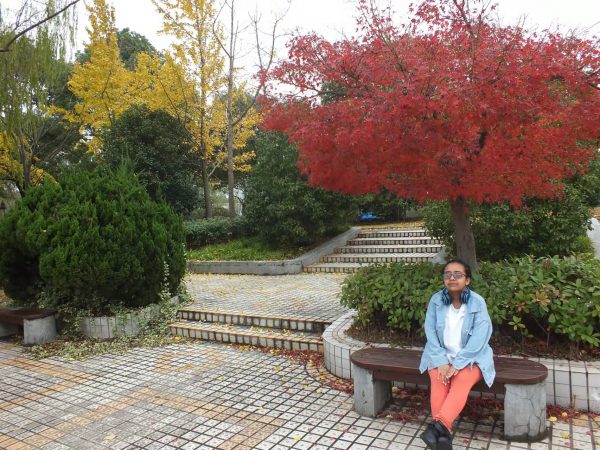Editor’s Note: To Helina Fikru Yilma, a senior student of the University of Michigan-Shanghai Jiao Tong University Joint Institute (UM-SJTU JI, JI hereafter), the city of Shanghai is a second home in her heart. The Ethiopian girl from the capital city of Addis Ababa was only able to stay on the campus of JI in Shanghai for 18 months because of the global COVID-19 pandemic. However, the unique culture, the welcoming people, and the profound lessons she learnt during her stay on campus enthralled her. “I am still on the journey to finding myself, but I know some part of me will always remain Chinese,” she said. In the below story written by Helina, she shares her unforgettable campus life experience as a JI student in Shanghai.

“Home is not just the place where you happen to be born. It’s the place where you become yourself.” This is a famous line I take from my favorite British writer Pico Iyer. According to Iyer, I now have two homes, thanks to the unforgettable experience of studying at the Michigan-Shanghai Jiao Tong University Joint Institute in the metropolitan city of Shanghai in China.
My campus story started when the plane that left Addis Ababa landed at Shanghai Pudong Airport on Sept 6th, 2018. For the 18-year-old me who have never left her city her whole life, the Pudong airport was my first glimpse of the world beyond my home city.
Growing up in Ethiopia’s tropical climate famously known for its 13 months of sunshine, the weather in Shanghai was my first cultural shock. The humid hot air in the airport at 10 pm was nothing like I expected. I was naive enough to think it was due to the plane, not the actual weather. But just like all the other lessons I would learn in college, I got used to the weather. Now that same weather that shocked me at first makes me reminisce about my excitement when the first snow landed against my dormitory window. It makes me think of the beauty of the fallen leaves in autumn, the scare of typhoon Lekima in the summer, and the appeal of the flowers that covered our campus in spring.

Helina Fikru Yilma rests at a small park on the campus of Shanghai Jiao Tong University.
Needless to say language barrier was a running theme in my camps life. In hindsight, moving to China only knowing how to say Ni hao (Hello in English) and Xie Xie (Thanks in English) in a butchered pronunciation was a huge mistake on my part. I had to rely on translator apps to converse with the locals. However, what made me realize coming to China was worth all the hassle was how welcoming the people were. Even though there was a huge language barrier between us, I could feel the kindness they radiated. I don’t think I will ever forget two individuals in particular.
One was the kind āyí (Aunt in English, here referring to a mid-aged housekeeper) in our dorm building. Even though I couldn’t understand a word she said without a translator app, she was still a mother figure to me. It was her microwave I used to make popcorn for movie nights after exams. It was at her place I went whenever I needed anything really. Because no matter how ridiculous the translation to my question was, I knew she was always ready to help with a huge smile on her face.
The second was the shūshu (Uncle in English, here referring to a mid-aged courier worker) with a contagious smile who worked for a food delivery company. When he greeted me with a smile I couldn’t help but return, I felt like he was a family member I knew since forever. From repeating “waimai” (Takeaway in English) so that I know who called when he called to learning English words to greet us, he showed me the welcoming hands of the locals. Let’s just say they were a huge motivator when learning Mandarin. I really wanted to study enough words to start expressing my gratitude to them. 谢谢阿姨, 谢谢叔叔! (Chinese expression of thanking aunt and uncle.)

Helina Fikru Yilma attends an international food-themed event in Shanghai.
If locals’ welcoming attitude was what drew me into Chinese culture, Chinese cuisine was what took my heart. The foods I came to love and appreciate are such a delicacy that I ain’t complaining about my heart. From the snacks to clay pot rice in the campus canteen, from the street food lamb skewer to hotpot, the food gave me comfort. When I was homesick, when the exam was a little too hard or when the project is due at 11:59 pm and I am left with a ton to do, the sweet and spicy vegetable dishes, the delicious fried rice and dumplings were my go-to dishes. The food might not change my grades but hey it was a nice way to bond with fellow students. I will never forget the food and laughter I shared with both Chinese and international friends whenever we got together.
Now that I have mentioned my fellow students, let me tell you a bit about them. I am studying in the heart of Shanghai. Our school has programs ranging from undergraduate to postgraduate studies. Hence, I met many students from different backgrounds each day. Whether it is while we were riding the campus shuttle bus or the library, the common trait I observed was their grit. They celebrated hard work and achieving their goal. Even at the badminton court or the running sidewalk, their commitment was a nudge for me to strive towards my own goals.
Fast forward to now, I have been studying online from my home country since 2019. Even though my stay at campus might be short-lived due to the ongoing COVID-19 pandemic, I consider Shanghai my second home. The lessons I learned during the 18 months stay there were so profound that I will not dare to ignore them. I am still on the journey to finding myself, but I know some part of me will always remain Chinese. Hence why I am bold enough to say, “I have two homes in my heart, one in the hub of Africa, Addis Ababa, and one in the heart of Asia, Shanghai.”





